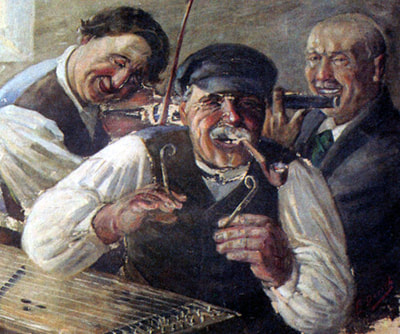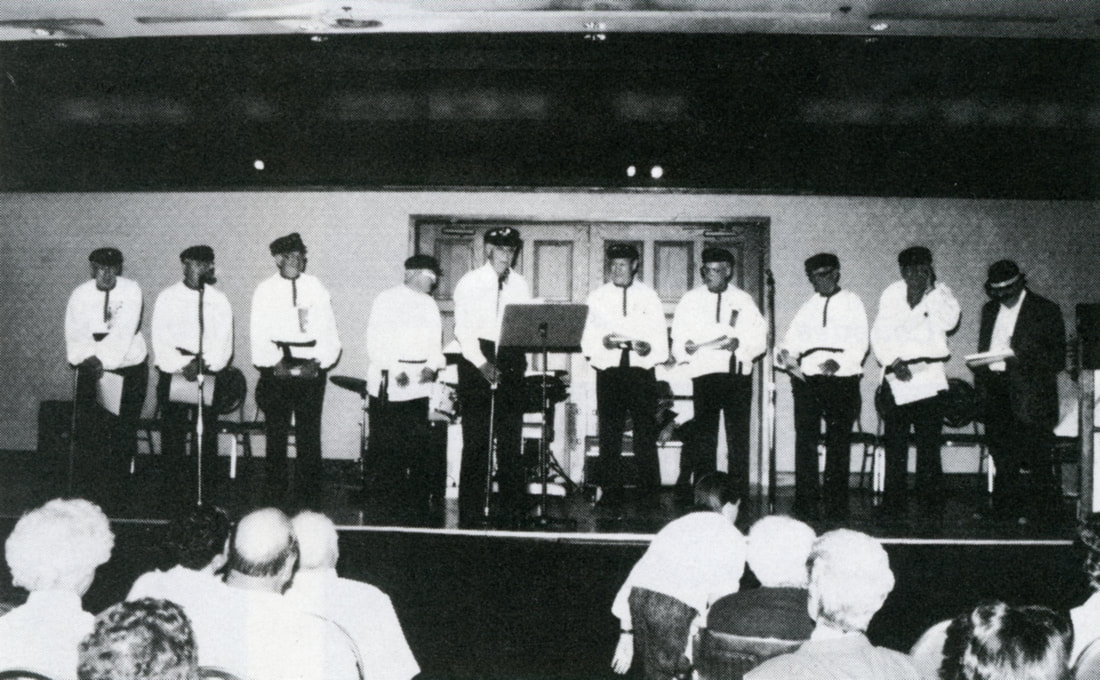Community > Folk Music
Folk Music
The Volga German colonists carried their German homelands' traditional folk and religious music to Russia. Although there were no songbooks with notes in the Volga colonies, the music lived on in the memories of older people and was constantly renewed through the singing of younger people. And so, the music of the Volga Germans was passed down from generation to generation and carried again to their new homeland in America.
Homeland songs, maternal tones, |
Bands would play on festive occasions such as holidays and weddings. Commonly used instruments were the Hackbrett (hammered dulcimer), Zieharmonika (accordion), violin, and various brass instruments. The accordion was invented about 1845 in Vienna, Austria, and it would have taken some time to find its way to the lower Volga region. Before that time, the violin provided the primary structure to the music.
Traditional Volga German polka music and dance became known as Dutch Hop in many parts of the midwestern United States and Canada. The word Dutch is a misnomer that most likely came from a misunderstanding of Deutsch (German). Many Volga Germans say their ancestors deliberately ignored the misunderstanding because of the widespread anti-German sentiments they encountered during World War I and World War II. As a result, the music remains known as Dutch Hop to this day. Although the music was the same, the Dutch Hop label wasn't used in Portland, where the performances were known as German Dances.
The best-known Volga German musician in Portland was Billy Starkel. Billy played regularly in Las Vegas, Los Angeles, and Honolulu and at the Hilton Hotel in Portland for many years. Billy's father, Henry Starkel, was an accordion player who performed at weekend dances in a large hall above Weimer's Hardware and Furniture Store on Union Avenue.
My father was an ‘old country’ accordionist and he started me out on the old button row accordion. We’d sometimes play in grange halls and they’d only heat these halls up once while. The old piano would sit there in the cold for weeks and then they’d light up the big-potbellied stove and the piano would swell up. Then, my father would have to get bailing wire to help tune the piano so my mother could play it. -- Billy Starkel
Billy Starkel also led a local Vaudeville-style act known as the "Volga Warblers." The group of eleven members included Pete Beach, Wally Borgens, Cliff Haberman, Bill Krieger, Pete Koch, Adam Koch, Al Macht, John Ehrlich, Pete Hohnstein, Mr. Baker, and Jack Deines.
Sources
Early, Dean. "Gun-music trade pleases Starkel." The Oregonian, February 5, 1975. A15.
Goldenstein, Kurt Edward. Colorado Dutch Hop Music Arranged for the Accordian: The Music, History, and Culture of Colorado's Germans from Russia. Colorado: Colorado Council on the Arts, 2000. Print.
Krieger, Marie Trupp.
Starkel, Randy. "Short Stories About My Father, Billy Starkel."
"Portland musician Billy Starkel dies; career included radio, hotel bands", The Oregonian, Thursday January 21, 1988, pg. E5.
Goldenstein, Kurt Edward. Colorado Dutch Hop Music Arranged for the Accordian: The Music, History, and Culture of Colorado's Germans from Russia. Colorado: Colorado Council on the Arts, 2000. Print.
Krieger, Marie Trupp.
Starkel, Randy. "Short Stories About My Father, Billy Starkel."
"Portland musician Billy Starkel dies; career included radio, hotel bands", The Oregonian, Thursday January 21, 1988, pg. E5.
Last updated November 16, 2023

